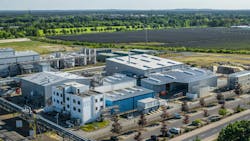BASF Launches One of Europe’s Largest Battery Recycling Plants
BASF has begun commercial operations at its new black mass facility in Schwarzheide, Germany, the company said June 3.
The plant has the capacity to process 15,000 tons of lithium-ion batteries yearly — equivalent to roughly 40,000 electric vehicle batteries.
Black mass production is a key step in the battery recycling process. It contains high amounts of key metals used to produce cathode active materials, including lithium, nickel, cobalt and manganese.
The recycled metals are used to produce new cathode active materials, enabling circularity and reducing the carbon footprint compared to using only primary raw materials, the company said.
The new plant “will become a cornerstone” of BASF’s offerings to customers to supply battery raw materials and comply with EU battery regulations, said Daniel Schönfelder, president of BASF’s battery materials division.
“With the new black mass plant, we strengthen our position as the preferred battery recycling partner for customers along the entire battery recycling value chain in Europe,” he said.
BASF’s offering in Europe covers all steps along the battery recycling value chain, from collecting end-of-life batteries and production scrap, discharging and dismantling, as well as black-mass production and refining.
About the Author
Jonathan Katz
Executive Editor
Jonathan Katz, executive editor, brings nearly two decades of experience as a B2B journalist to Chemical Processing magazine. He has expertise on a wide range of industrial topics. Jon previously served as the managing editor for IndustryWeek magazine and, most recently, as a freelance writer specializing in content marketing for the manufacturing sector.
His knowledge areas include industrial safety, environmental compliance/sustainability, lean manufacturing/continuous improvement, Industry 4.0/automation and many other topics of interest to the Chemical Processing audience.
When he’s not working, Jon enjoys fishing, hiking and music, including a small but growing vinyl collection.
Jon resides in the Cleveland, Ohio, area.

